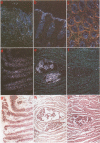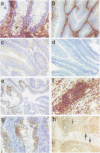Abstract
AIM: To study the cellular distribution of CD44 mRNA transcripts in tissue sections of colorectal cancer and corresponding normal colonic mucosa in order to correlate the findings with information from immunohistochemical methods and previous data from analysis by reverse transcription-polymerase chain reaction (RT-PCR). METHODS: In situ hybridisation (ISH) analysis of CD44 standard (CD44s) and variant (CD44v) mRNA in cryostat sections of normal and neoplastic colonic mucosa with 35S-labelled riboprobes. Immunohistochemistry was performed on cryostat sections from the same patients using monoclonal antibodies directed against epitopes encoded by CD44 exon 1 (F.10.44.2), exon 5, (Hermes 3), exon 7 (23.6.1), and exon 11 (2F10). RESULTS: CD44s and CD44v transcripts were both strikingly increased in carcinomas compared with corresponding normal mucosa and the abundant CD44v transcripts in tumour tissues were localised exclusively in the cancer cells. CD44s transcripts were present in cancer, inflammatory and resident stromal cells, but the relative amount in carcinoma cells was greater. Immunohistochemical staining broadly paralleled these results, but some clumps of tumour cells showed clear heterogeneity with regard to CD44 protein content. There were also some scattered focal discrepancies in the quantity and distribution of mRNA transcripts and proteins, respectively. CONCLUSIONS: The ISH technique provides powerful independent corroboration of elevated CD44 gene expression and disproportionately high transcription of CD44v isoforms in carcinoma cells observed in earlier immunohistochemical and RT-PCR studies. It unequivocally localises the abnormally elevated gene transcription within the cancer cells and not in the surrounding inflammatory cells.
Full text
PDF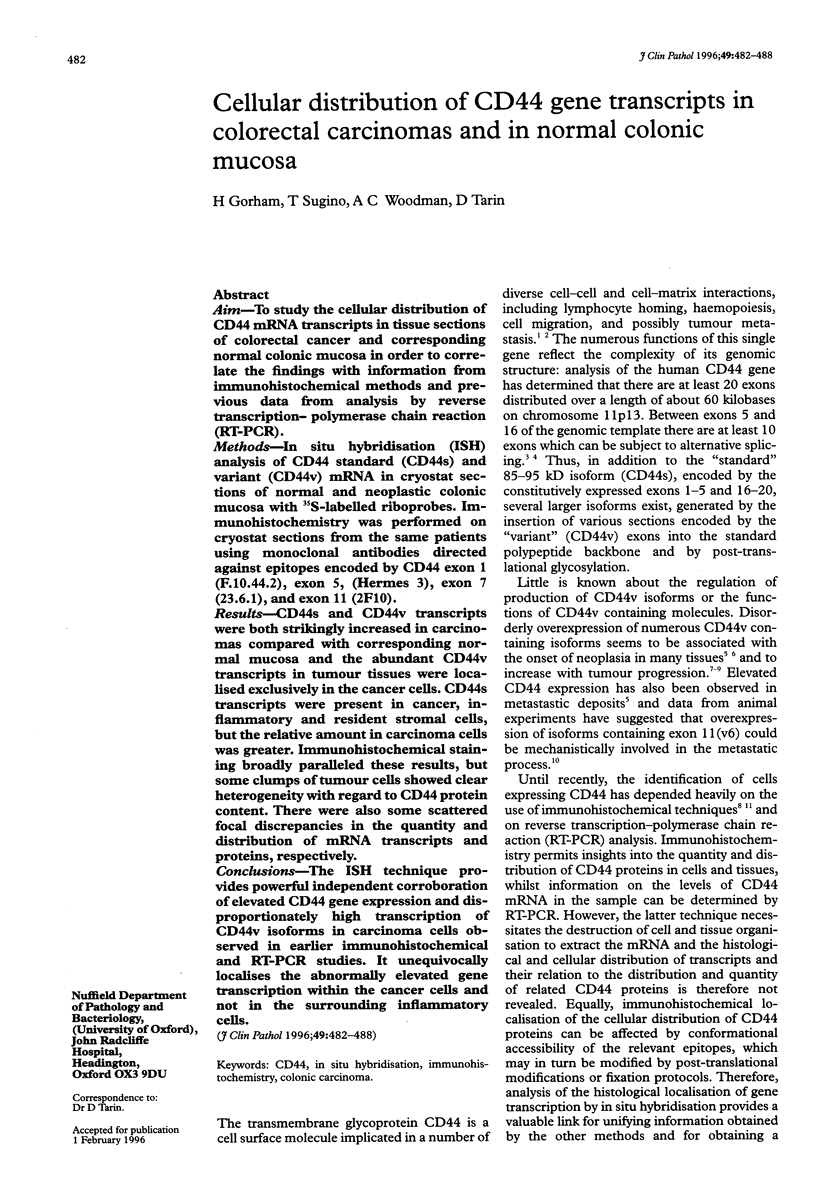
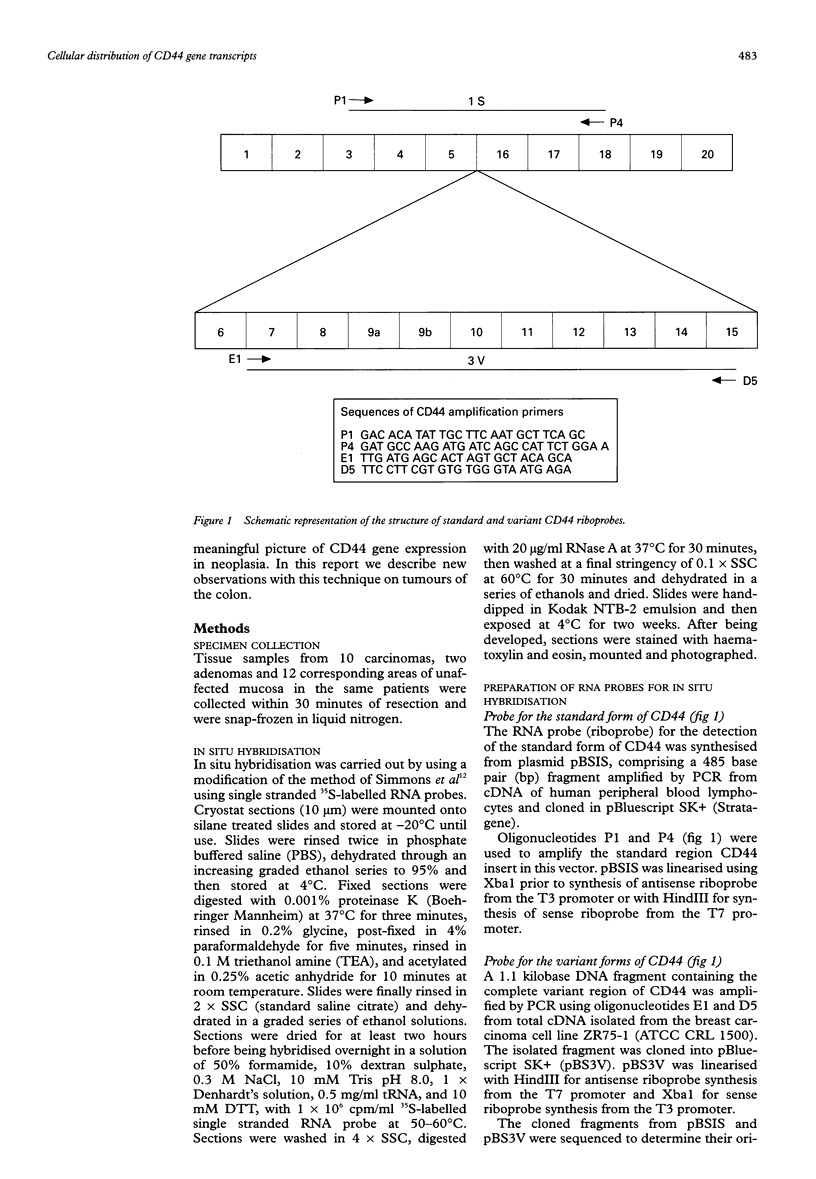
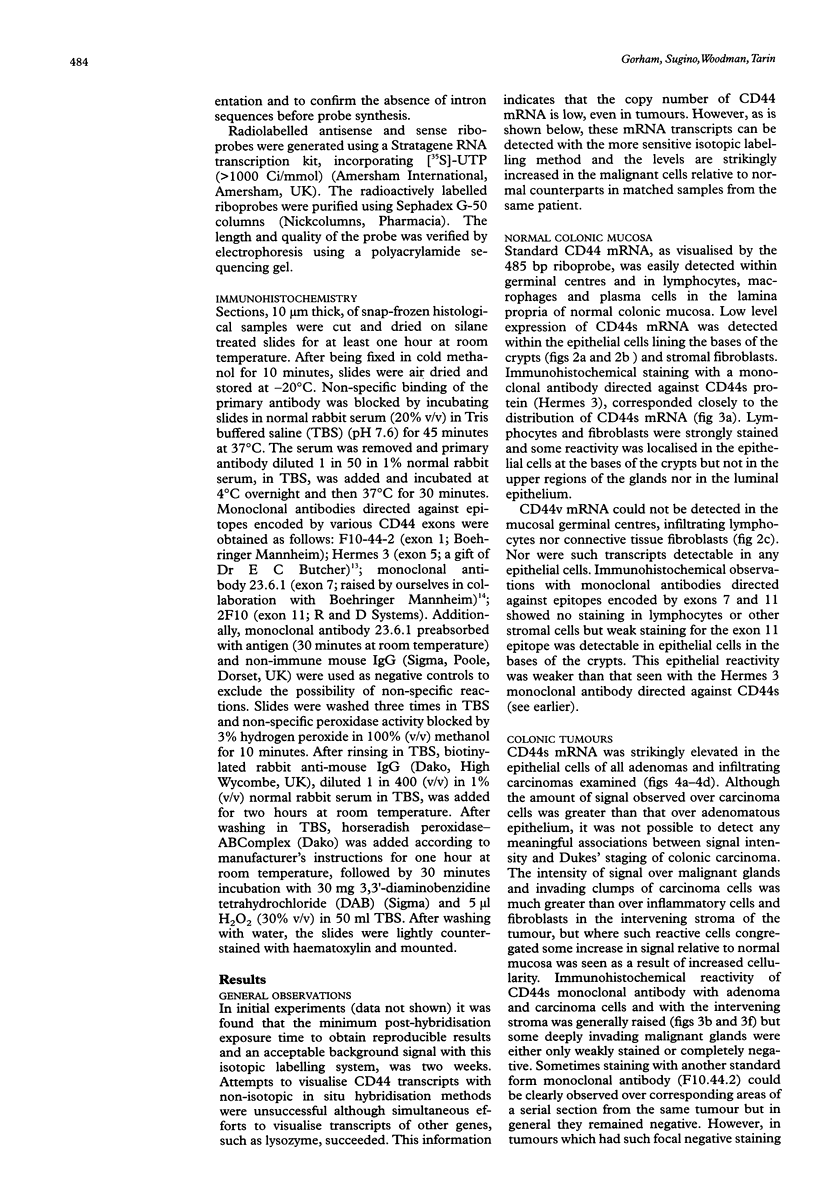
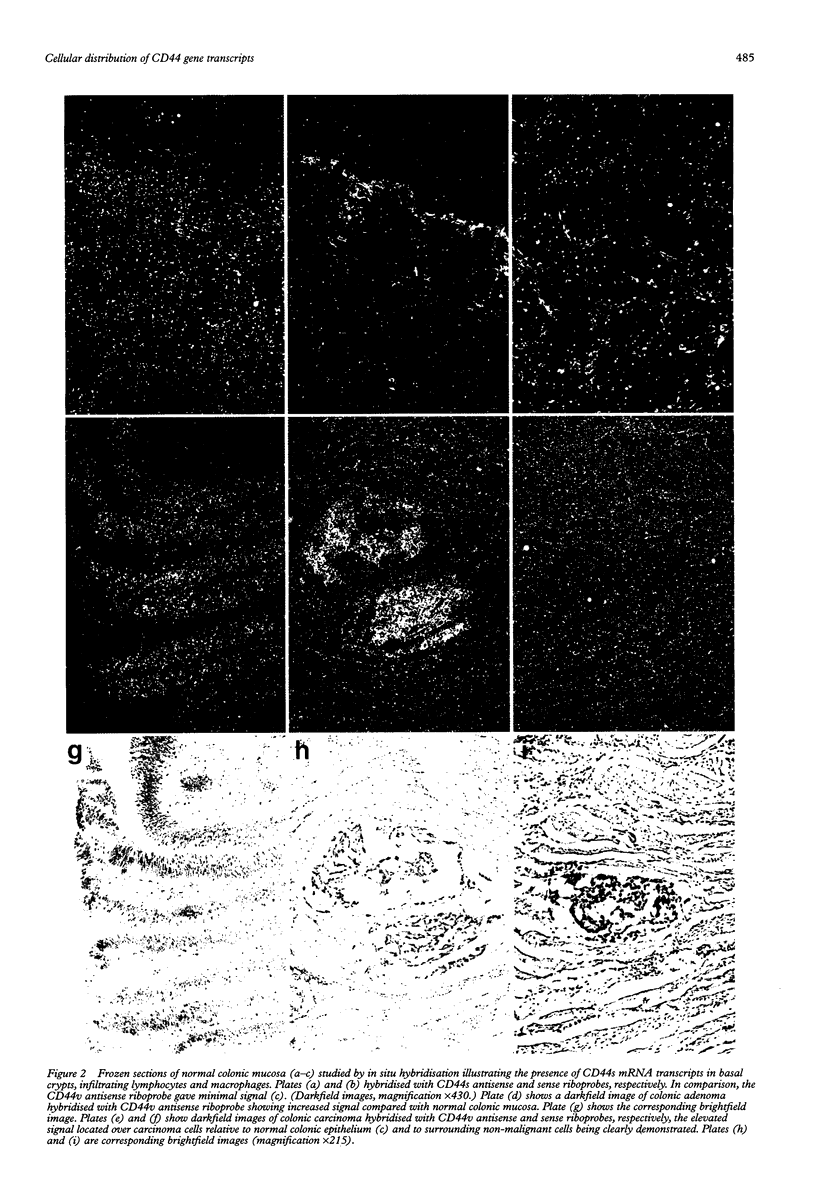
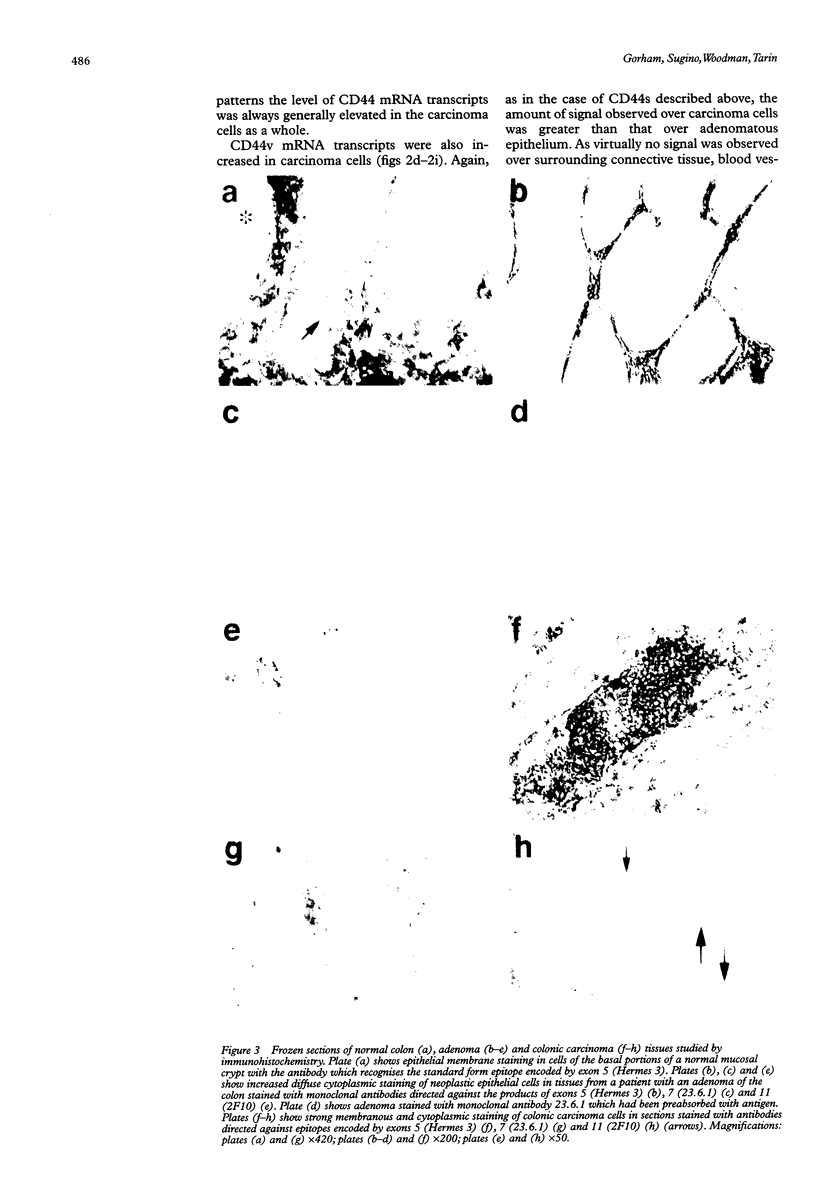
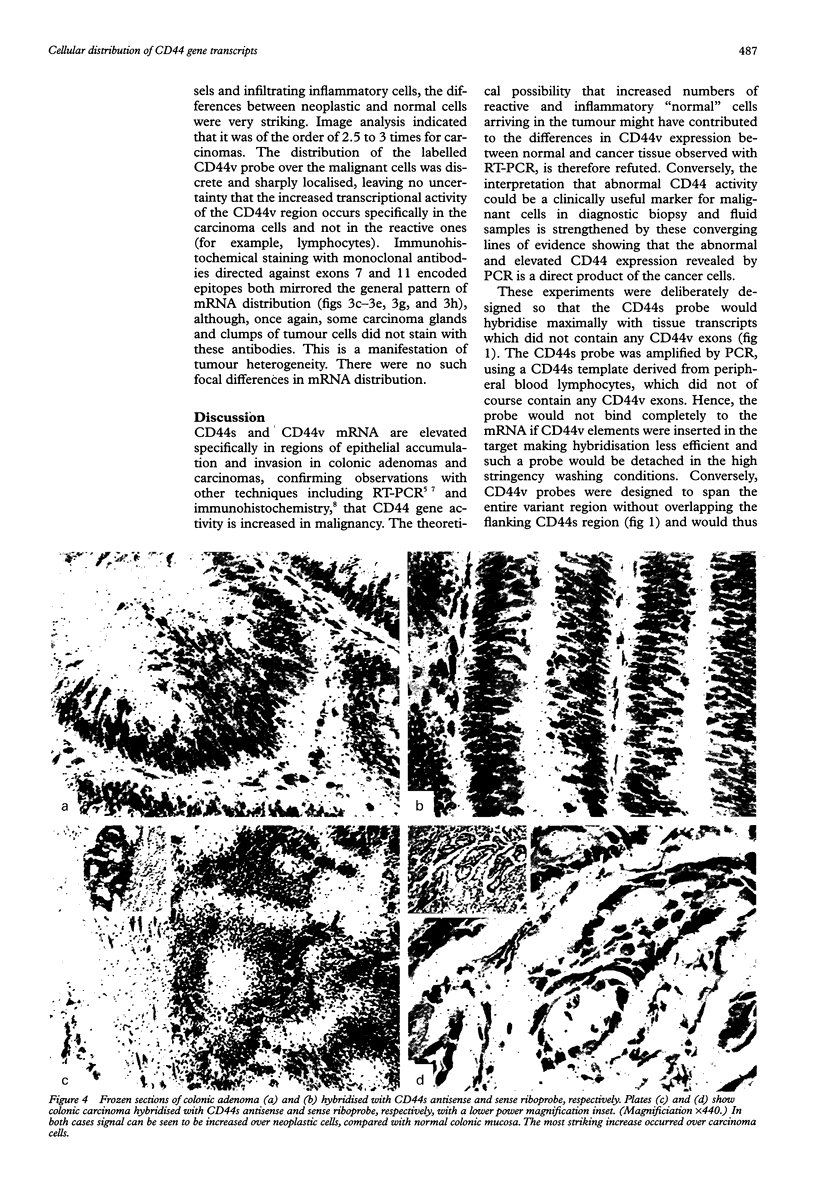
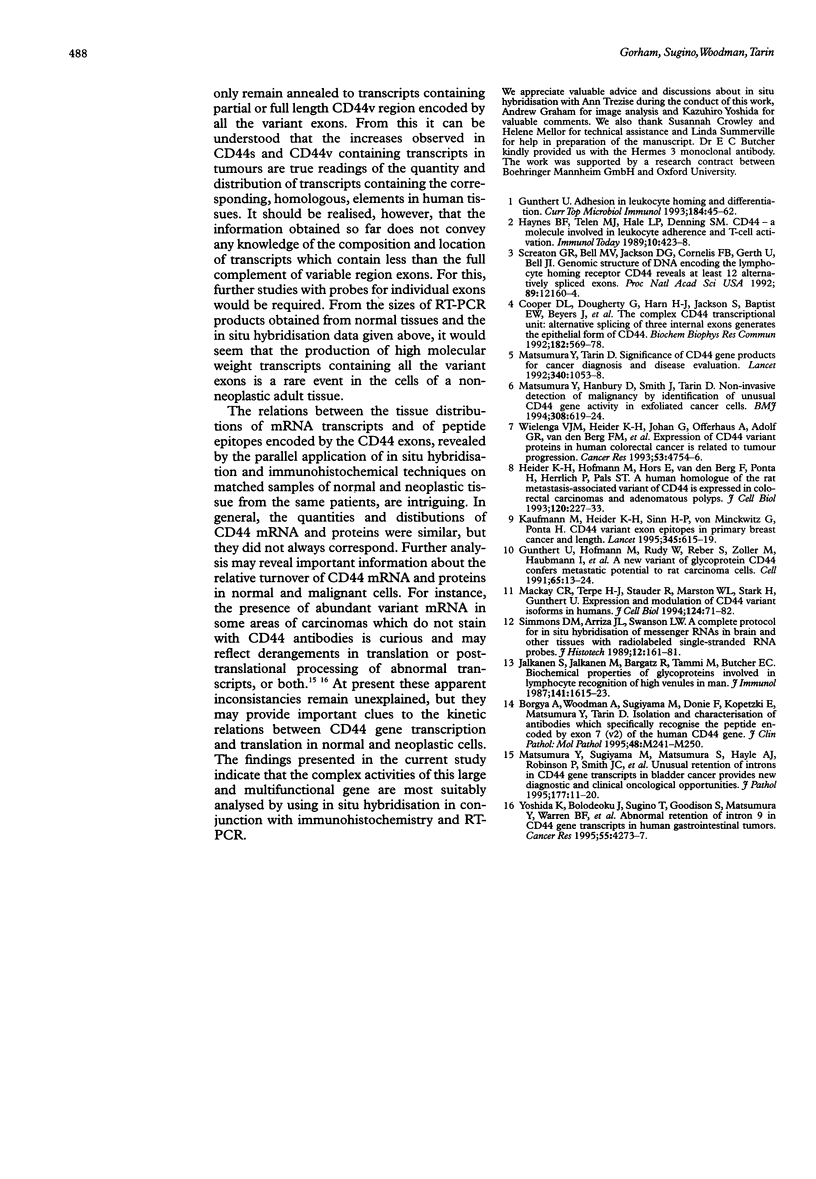
Images in this article
Selected References
These references are in PubMed. This may not be the complete list of references from this article.
- Borgya A., Woodman A., Sugiyama M., Donié F., Kopetzki E., Matsumura Y., Tarin D. Isolation and characterisation of antibodies which specifically recognise the peptide encoded by exon 7 (v2) of the human CD44 gene. Clin Mol Pathol. 1995 Oct;48(5):M241–M250. doi: 10.1136/mp.48.5.m241. [DOI] [PMC free article] [PubMed] [Google Scholar]
- Cooper D. L., Dougherty G., Harn H. J., Jackson S., Baptist E. W., Byers J., Datta A., Phillips G., Isola N. R. The complex CD44 transcriptional unit; alternative splicing of three internal exons generates the epithelial form of CD44. Biochem Biophys Res Commun. 1992 Jan 31;182(2):569–578. doi: 10.1016/0006-291x(92)91770-q. [DOI] [PubMed] [Google Scholar]
- Günthert U., Hofmann M., Rudy W., Reber S., Zöller M., Haussmann I., Matzku S., Wenzel A., Ponta H., Herrlich P. A new variant of glycoprotein CD44 confers metastatic potential to rat carcinoma cells. Cell. 1991 Apr 5;65(1):13–24. doi: 10.1016/0092-8674(91)90403-l. [DOI] [PubMed] [Google Scholar]
- Haynes B. F., Telen M. J., Hale L. P., Denning S. M. CD44--a molecule involved in leukocyte adherence and T-cell activation. Immunol Today. 1989 Dec;10(12):423–428. doi: 10.1016/0167-5699(89)90040-6. [DOI] [PubMed] [Google Scholar]
- Heider K. H., Hofmann M., Hors E., van den Berg F., Ponta H., Herrlich P., Pals S. T. A human homologue of the rat metastasis-associated variant of CD44 is expressed in colorectal carcinomas and adenomatous polyps. J Cell Biol. 1993 Jan;120(1):227–233. doi: 10.1083/jcb.120.1.227. [DOI] [PMC free article] [PubMed] [Google Scholar]
- Jalkanen S., Jalkanen M., Bargatze R., Tammi M., Butcher E. C. Biochemical properties of glycoproteins involved in lymphocyte recognition of high endothelial venules in man. J Immunol. 1988 Sep 1;141(5):1615–1623. [PubMed] [Google Scholar]
- Kaufmann M., Heider K. H., Sinn H. P., von Minckwitz G., Ponta H., Herrlich P. CD44 variant exon epitopes in primary breast cancer and length of survival. Lancet. 1995 Mar 11;345(8950):615–619. doi: 10.1016/s0140-6736(95)90521-9. [DOI] [PubMed] [Google Scholar]
- Mackay C. R., Terpe H. J., Stauder R., Marston W. L., Stark H., Günthert U. Expression and modulation of CD44 variant isoforms in humans. J Cell Biol. 1994 Jan;124(1-2):71–82. doi: 10.1083/jcb.124.1.71. [DOI] [PMC free article] [PubMed] [Google Scholar]
- Matsumura Y., Hanbury D., Smith J., Tarin D. Non-invasive detection of malignancy by identification of unusual CD44 gene activity in exfoliated cancer cells. BMJ. 1994 Mar 5;308(6929):619–624. doi: 10.1136/bmj.308.6929.619. [DOI] [PMC free article] [PubMed] [Google Scholar]
- Matsumura Y., Sugiyama M., Matsumura S., Hayle A. J., Robinson P., Smith J. C., Tarin D. Unusual retention of introns in CD44 gene transcripts in bladder cancer provides new diagnostic and clinical oncological opportunities. J Pathol. 1995 Sep;177(1):11–20. doi: 10.1002/path.1711770104. [DOI] [PubMed] [Google Scholar]
- Matsumura Y., Tarin D. Significance of CD44 gene products for cancer diagnosis and disease evaluation. Lancet. 1992 Oct 31;340(8827):1053–1058. doi: 10.1016/0140-6736(92)93077-z. [DOI] [PubMed] [Google Scholar]
- Screaton G. R., Bell M. V., Jackson D. G., Cornelis F. B., Gerth U., Bell J. I. Genomic structure of DNA encoding the lymphocyte homing receptor CD44 reveals at least 12 alternatively spliced exons. Proc Natl Acad Sci U S A. 1992 Dec 15;89(24):12160–12164. doi: 10.1073/pnas.89.24.12160. [DOI] [PMC free article] [PubMed] [Google Scholar]
- Wielenga V. J., Heider K. H., Offerhaus G. J., Adolf G. R., van den Berg F. M., Ponta H., Herrlich P., Pals S. T. Expression of CD44 variant proteins in human colorectal cancer is related to tumor progression. Cancer Res. 1993 Oct 15;53(20):4754–4756. [PubMed] [Google Scholar]
- Yoshida K., Bolodeoku J., Sugino T., Goodison S., Matsumura Y., Warren B. F., Toge T., Tahara E., Tarin D. Abnormal retention of intron 9 in CD44 gene transcripts in human gastrointestinal tumors. Cancer Res. 1995 Oct 1;55(19):4273–4277. [PubMed] [Google Scholar]



